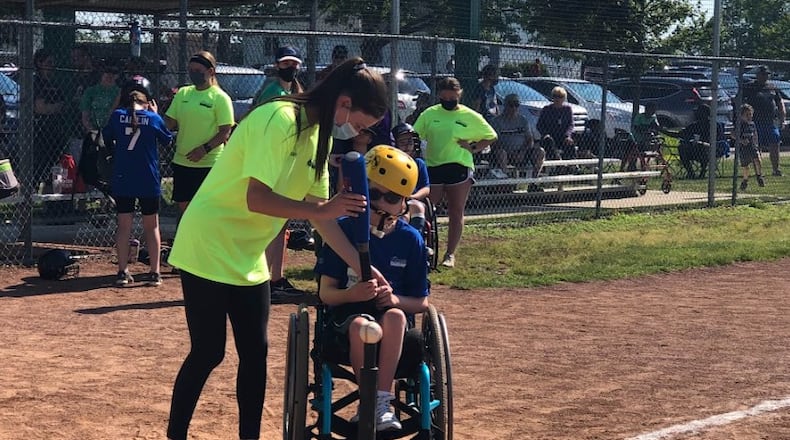The 138 current members of the Mason Challenger League currently play at Cottell Park, Heritage Oaks Park or the Mason Sports Park, but the typical fields have design issues — for instance, dugouts that can’t accommodate wheelchairs. “If a wheelchair doesn’t fit in a dugout, our players can’t sit with their friends,” said Susan Murdock of the Mason Challenger League. “And friendships and camaraderie happen in the dugout.” The new fields will have dugouts that are 32 feet by 12 feet, giving plenty of room for all players. They’re also designed to have several benches instead of a continuous bench, so those using mobility devices aren’t relegated just to the ends of the dugout.
The field will be fully enclosed with fencing and be completely level. The fields will feature artificial turf, rather than the rubberized surface that some adaptive ball fields have. “We try really hard to make our players’ experience as close to their friends as possible,” said Murdock.
She added that the turf will also allow for the fields to be used by other teams when the Challenger League isn’t playing.
Another challenge that some current ball fields have is access to parking lots. “We’ve had days after rain in which the fields themselves are playable, but conditions make it difficult for our players to get to the field. We’ve had to carry wheelchairs across wet grass.” The new fields will provide pathways from parking to the field.
The location next to Common Ground Playground at Makino Park is a bonus, said Murdock. “After the games, our players like to play with their friends. The accessible playground makes that possible.”
A groundbreaking ceremony in July marked the start of construction of the Adaptive Ball Fields on the city-owned land, but the project began several years earlier.
“In 2020, the city called us and asked if we’d be interested in working with them to build adaptive baseball fields,” said Murdock.
They brainstormed, planned, and after a pandemic-related delay, began fundraising for the estimated $2.1 million project.
As the city, with the help of retired police chief Ron Ferrell, worked on county and state grants, the Challengers and the Mason Parks & Recreation Foundation sought corporate and individual donations, and in November 2022 they reached their goal. However, by then inflation and supply issues had nearly doubled the cost of construction. Murdock said that was a shock. “We licked our wounds for a few weeks and worked on solutions,” she said, and they began to figure out what features were necessary and which could be delayed for a second phase. “Steve Cadell, project manager for the City of Mason was instrumental in originally taking our suggestions and ideas and turning them into a concept,” said Murdock. “He also did a lot of work to see how we could make the project meet our financial goals when it went out to bid a second time.” When it was sent out for bids again in February of this year, they found that between the slimmed-down project and fewer material supply issues, they could move forward with construction.
Murdock said that along with grants from the county and state and matching funds from the City of Mason, numerous companies and organizations stepped up — including the Joe Barr Post 194 American Legion, the Love Like JJ Foundation, MI Homes, Dick’s Sporting Goods, Wealth Quest, Natorp, GE Credit Union, State Farm and others. She said they are still fundraising for those items that were left out of the revised bid, including dugout benches, spectator bleachers, a sound system, and lighting.
But the Adaptive Ball Fields are a reality, Murdock said, because of the City of Mason.
“Without the city, and former chief Ron Ferrell’s efforts, though, the project wouldn’t have happened,”
What’s in the future? Murdock said the hope is that design elements from the new Adaptive Ball Fields will be incorporated into typical fields as Mason renovates local parks, making them more accessible to spectators, families, and others.
“Imagine dugouts that can accommodate coaches in wheelchairs, for instance,” Murdock said.
For more information about the project and ways to help, go to masonchallengeradaptivefields.com.
About the Author


